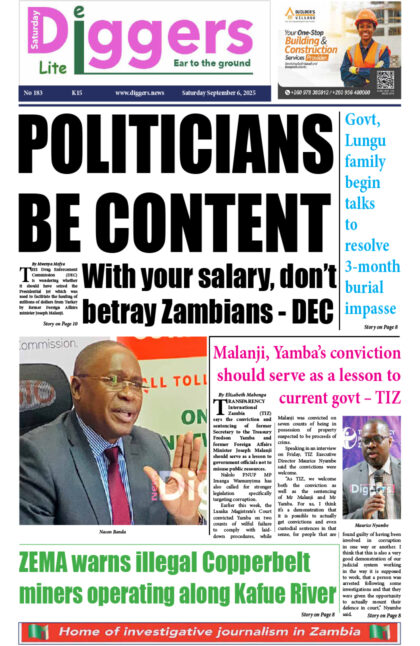Weaknesses in the management of Zambia’s public finances and investment pose significant risks to the 2017 budget objectives, says the International Monitory Fund (IMF).
The IMF team led by Tsidi Tsikata was in the county from 31st May to 10th June to continue discussions over government’s request for an IMF-supported program.
Tsikata made several observations into Zambia’s financial management approach.
“Weaknesses in the management of public finances and public investment pose significant risks to the 2017 budget objectives of ‘restoring fiscal fitness for sustained inclusive growth and development’ and scaling up social spending,” said Tsikata in a statement issued from Washington DC.
The mission welcomed “the heightened attention and efforts underway” to strengthen the legal framework for managing public resources, including the introduction of the Planning and Budgeting Bill, and amendments to the Public Finance and Public Procurement Acts.
“Improved fiscal performance and discipline are needed to sustain market confidence. Fiscal performance in the first four months of 2017 was mixed relative to budget estimates. Total domestic revenue (tax and nontax) fell short of the projected level while total expenditures appeared to be broadly in line with the budget. However, on the expenditure side, while the government has cleared substantial arrears, it appears that new arrears may be emerging. The government is taking steps to strengthen commitment control, including by expanding the coverage of IFMIS (Integrated Financial Management Information System) to all central government agencies. Other remaining fiscal measures relate to reduced spending on the Farmer Input Support Program through improved targeting of beneficiaries and limiting maize purchases to the level in the budget,” he observed.
“Against the backdrop of contraction of credit to the private sector and a benign inflation outlook, the mission welcomed recent further easing of monetary conditions by the Bank of Zambia.”
Tsikata said the mission and the authorities have agreed on remaining actions needed to reach staff-level agreement on a program that could be supported under the IMF’s Extended Credit Facility (ECF).
“The remaining actions entail measures to improve fiscal performance and concrete steps toward implementation of key policies contained in the 2017 budget. We aim to reach understandings in the coming weeks that would form the basis for presenting the authorities’ request for an ECF arrangement and the report on the 2017 Article IV consultation to the IMF Executive Board in August 2017,” he stated.
Tsikata observed some improvements in the near-term outlook for the economy in recent months, driven by good rains and positive sentiments in the financial markets evidenced by increased foreign investor participation in the government securities market.
“The near-term outlook for the economy has improved in recent months, driven by good rains and positive sentiments in the financial markets as evidenced by increased foreign investor participation in the government securities market. A bumper harvest and increased hydroelectricity generation are expected to boost economic activity by more than previously projected; the mission projects real GDP growth to improve slightly from the revised official rate of 3.4 percent in 2016 to about 4 percent in 2017. We also project the annual inflation rate (6.5 percent in May) to remain at single-digit levels, notwithstanding the impact of the move toward cost-reflective electricity tariffs.”
The mission met with President Edgar Lungu, Minister of Finance Felix Mutati, Bank of Zambia Governor Denny Kalyalya, Minister of Agriculture Dora Siliya, Minister of Development Planning Lucky Mulusa and other senior government and BoZ officials. Others were members of parliament, representatives of the private sector, labor unions, civil society organisations, and Zambia’s development partners.
























